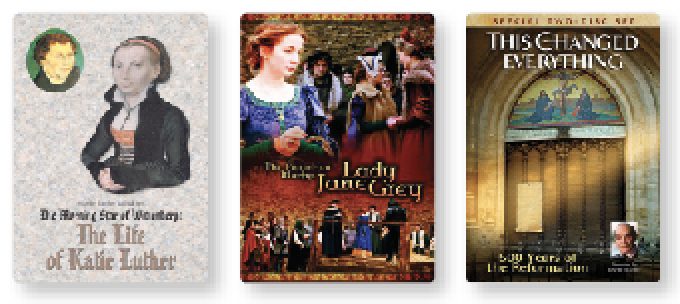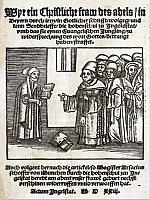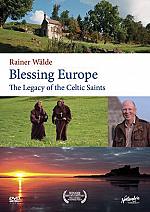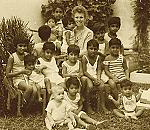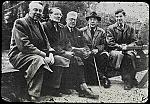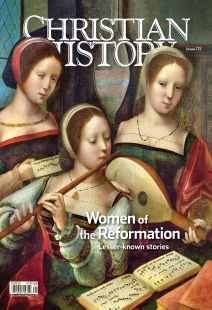Women of the Reformation: recommended resources
[For information about the videos, see below]
Books
For many years the most famous series of books telling the specific stories of Reformation women has been Roland Bainton’s Women of the Reformation in Germany and Italy (1971); Women of the Reformation in France and England (1973); and Women of the Reformation: From Spain to Scandinavia (1977). They still make engaging reading and, as with the general surveys below, include profiles of some women from this issue.
More recent treatments of women’s roles in the Reformation include Steven Ozment, When Fathers Ruled (1983); Lorna Jane Abray, The People’s Reformation (1985); Jane Dempsey Douglass, Women, Freedom, and Calvin (1985); Arnold Snyder and Linda Huebert Hecht, eds., Profiles of Anabaptist Women (1997); Susan Karant-Nunn and Merry Wiesner-Hanks, eds., Luther on Women (2003); Kirsi Stjerna, Women and the Reformation (2008); Marjorie Plummer, From Priest’s Whore to Pastor’s Wife (2016); Rebecca VanDoodewaard, Reformation Women (2017); and Merry Wiesner-Hanks, Women and Gender in Early Modern Europe (2019).
For more on Marguerite of Navarre and Jeanne d’Albret, consult Nancy Lyman Roelker, Queen of Navarre (1968); S. Amanda Eurich, The Economics of Power (1994); David Bryson, Queen Jeanne and the Promised Land (1999); Barbara Stephenson, The Power and Patronage of Marguerite de Navarre (2004); Patricia and Rouben Cholakian, Marguerite de Navarre (2006); Carol Thysell, The Pleasure of Discernment (2007); Gary Ferguson and Mary McKinley, eds., A Companion to Marguerite de Navarre (2009); Jonathan Reid, King’s Sister—Queen of Dissent (2009). Some of Marguerite’s correspondence is in The Mirror of All Christian Queens (2015), edited and translated by Valerie Foucachon, and some of Jeanne’s writings are collected in Letters from the Queen of Navarre with an Ample Declaration, edited and translated by Kathleen Llewellyn, Emily Thompson, and Colette Winn (2016).
You’ll find Marie Dentière’s works in Epistle to Marguerite de Navarre and Preface to a Sermon of Calvin, translated and edited by Mary McKinley (2004).
There is much more on Argula von Grumbach in Peter Matheson’s Argula von Grumbach (1492–1554/7): A Woman Before Her Time (2013). Matheson has translated her works in Argula von Grumbach: A Woman’s Voice in the Reformation (1995).
The queens of the English Reformation—and other Englishwomen—feature in Norman Jones, Faith by Statute (1982); David Loades, Mary Tudor (2006); John Guy, ed., The Reign of Elizabeth I (1995); Wallace MacCaffrey, Elizabeth I (1993); Sharon Jansen, Dangerous Talk and Strange Behavior (1996); Andrew Pettegree, Marian Protestantism (1997); David Starkey, Elizabeth (2000); Paul Zahl, Five Women of the English Reformation (2001); Christine Peters, Patterns of Piety (2003); Eric Ives, The Life and Death of Anne Boleyn (2004); Alison Plowden, Elizabeth I (2004); Charles Beem, The Lioness Roared (2006); and Eamon Duffy, Fires of Faith (2009) and, with David Loades as co-editor, The Church of Mary Tudor (2006).
Read more about Katharina Schütz Zell in Elsie McKee, Katharina Schütz Zell (1998) and in McKee’s edition of her writings, Church Mother (2007).
For some of our really lesser-known women, there are no full-length books. This includes Margaret Blaurer, Margarethe Prüss, Ursula Jost, Katharina von Zimmern, Helena von Freyberg, and Anna Adlischwyler Bullinger. You’ll find short profiles of many in the books above by Bainton, Snyder and Hecht, Stjerna, and VanDoodewaard. Charlotte Duplessis-Mornay left us her husband’s biography (with a bit about her as well) in A Huguenot Family in the XVI Century (2018).
Christian History issues
Here are past issues on some topics related to this issue’s themes. You can read them all online, and some are still available for purchase:
• 4: Ulrich Zwingli
• 5: The Anabaptists
• 12: John Calvin
• 17: Women in the Early Church
• 21: Caspar Schwenckfeld
• 30: Women in the Medieval Church
• 46: John Knox
• 48: Thomas Cranmer and the English Reformation
• 83: Mary in the Imagination of the Church
• 115: Luther Leads the Way
• 118: The People’s Reformation
• 120: Calvin, Councils, and Confessions
• 122: The Catholic Reformation
In addition, CHI’s Great Women in Christian History has a profile of Katie Luther.
Videos from Vision Video
Videos related to this issue’s stories include Pioneers of the Spirit: Teresa of Ávila; The Forgotten Martyr: Lady Jane Grey; The Morning Star of Wittenberg: The Life of Katie Luther; The Radicals, and of course our Reformation series video, This Changed Everything.
Websites
All the websites we mentioned in our original Reformation series remain good sources. These include the Christian Classics Ethereal Library, the H. Henry Meeter Center Post-Reformation Digital Library (which includes Reformation texts as well), the Medieval Sourcebook and Modern History Sourcebook hosted at Fordham University, Project Gutenberg, Project Canterbury, the Global Anabaptist Mennonite Encyclopedia Online, William Harmless’s Bibliographies for Theology, the Pitts Theology Library at Emory University, and the Cranach Digital Archive. CH
By the editors
[Christian History originally published this article in Christian History Issue #131 in 2019]
Next articles
“The gates of Hell cannot prevail”
Von Grumbach’s letter to the University of Ingolstadt protesting the arrest and exile of Arsacius Seehofer for holding Lutheran views, excerpted here, became her most famous and best-selling piece of writing
Argula von GrumbachSpiritual Friendship: Recommended Resources
Want to learn more about the stories featured in this issue? Check out these recommendations from our editors and from this issue’s authors.
The editorsHaystacks, starry clusters, and baptizing bishops
How God used friendships to spark mission throughout church history
Jennifer A. Boardman



